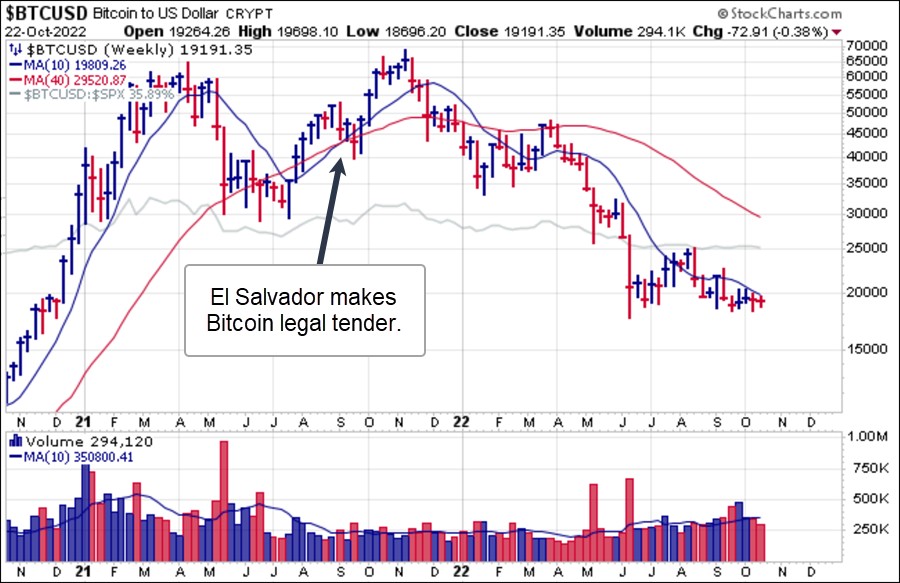By Gil Morales, October 25, 2022
Crypto currencies will either live or die on their own merits. It cannot be otherwise. When the automobile was invented, once it was perfected and the necessary infrastructure in the form of roads, bridges, fueling stations, fuel production and more was built out, nobody needed to be persuaded that a car was a good thing to have and use. There were no government mandates, there were no Michael Saylor clones running around spewing psycho-babble that “cars fix everything.” The automobile thrived on its own merits and continues to evolve today as a reliable form of transportation the world over.
The problem with crypto currencies, including Bitcoin, is that the entire space is overrun with hypesters and promoters. That is the first sign that something is not quite right. At its core, the idea of crypto-currency is quite compelling and appealing. If it is indeed insulated from “evil” government control and abuse and therefore immune to devaluation and instability as its promoters rant, then certainly it becomes an attractive means of exchange and store of wealth.
But it is not. Before anything else, Bitcoin and other crypto currencies must show concrete functionality as practical means of exchange and stores of value. Any other argument extolling the alleged virtues of Bitcoin or any other crypto is just blowing smoke. As they say, show me the money. It need not be any more complicated than that, and simple common sense should prevail.
Promoters of various crypto coins and tokens like to throw around esoteric terms like utility and community as virtues of the turds they have a stake in getting others to buy. As the joke goes, utility means the process of exhorting and inducing others to buy your coin or token to send the price rocketing higher so you can cash out at a hefty profit and buy yourself a new car. Community means that you have induced enough suckers to do just that. In many ways, all joking aside, this is precisely how the alleged promise of crypto has played out in real-time reality and objective results.
It also should not be necessary to “understand the technology” to appreciate the utility of crypto, or lack of it, as the case may be. I can pick up a rock and understand that yes, it is a rock, without understanding the geologic processes that created that rock. If it floats away from my hand, or bounces around like a rubber Superball™, well, then it probably isn’t a rock.
On its face, we can easily perceive some basic truths about crypto currencies like Bitcoin in real-time, concrete reality. When it comes to money and its essential purposes, there is no reason to exist on any other temporal and/or spatial plane. While crypto promoters, in fits of self-absorbed puffery, are often fond of portraying themselves as existing in a different dimension or intellectual space that we mere mortals simply do not understand, the final arbiter of crypto reality is really whether Bitcoin has any practical value and utility for mere mortals. And for that, it must be easy to understand and use.
As a means of exchange, it fails. The example of El Salvador is instructive in this regard, even ignoring the fact that its government, in a profound display of drunken fiscal irresponsibility, went and bought $104 million worth of Bitcoin which is now worth less than half that now. In late September 2021, right near the peak in Bitcoin, El Salvador declared Bitcoin to be legal tender. They then mandated that businesses accept it and gave citizens a wallet app dubbed chivo to use with Bitcoin and other currencies, enticing citizens to do so by throwing in a $30 bonus for those who downloaded it.

The vast majority of citizens took the free chivo app for the $30 government giveaway (not a difficult motive to understand) and now use the app almost entirely for buying things with dollars. A survey conducted by the El Salvadoran government that details facts about the country’s Bitcoin experiment is found here: https://camarasal.com/empresarios-proyectan-invertir-en-el-salvador-pese-a-los-retos-que-enfrenta-el-pais/
There have also been numerous anecdotes of consumers trying to pay for their stuff at stores and having to wait 15 minutes or more for their Bitcoin transaction to process, another weakness of the current technology infrastructure. In short, El Salvador’s adoption of Bitcoin as legal tender currency has resulted in no serious commercial penetration and little adoption by its citizens as they continue to prefer dollars.
As someone who comes from the working class, I am often amused by the privileged intellectual class’s failure to understand that when push comes to shove, people of lower means tend to prefer something simple they can hold in their hand, even if it is just a paper dollar. Call it a type of survival instinct. An instinct borne of being forced to contend with the basic issues of economic and social survival that often define the day-to-day lives of working people.
Tim Draper, former venture capitalist, founder of the VC firm Draper, Fisher, Jurvetson and a Stanford classmate and contemporary of mine, has been a vocal supporter of Bitcoin for many years now, and he certainly deserves credit for his keen investment perception by getting in exceedingly early. His perception may be limited to the investment side of the issue, however. In 2017, he declared that in five years everything that we buy would be bought with Bitcoin.
It is now late 2022, more than five years later, and I still do not see an option to pay with Bitcoin at any of the stores and other retail outlets that I frequent. Even if there were, I see no utility in using Bitcoin in its current state that differentiates it from simply using dollars via my Apple Pay or PayPal apps.
It is certainly fair to ask the question as to why anyone would use a means of exchange that exhibits a great deal of volatility unless it is converted from and to dollars immediately before and after a transaction takes place, respectively. Bitcoin is then relegated to the status of a temporary go-between. Otherwise, if one wishes to speculate on their daily purchases of basic goods and services, then have at it, I say.
Bitcoin is not a store of wealth, either. In theory, a store of wealth is something that maintains its purchasing power or even potentially increases its purchasing power over time. The U.S. dollar, as an example, has certainly not fulfilled its purpose as a store of wealth as the purchasing power of a dollar has diminished over 96% since the Federal Reserve Bank was created in 1913. One must also wonder whether, if U.S. stocks are priced in dollars, much of the U.S. stock market’s price appreciation since then has been due entirely to a devalued dollar, but that is a discussion for another day.
Some will argue that those who bought Bitcoin when it was much lower in value than it is today have “done well” with it and for that reason it has worked as a store of wealth. I would argue that it has in fact worked as a speculative investment, which cuts both ways. If they watched it go up to $68,000 and then back down to less than $20,000 it certainly did not serve to “store” the wealth realized when Bitcoin was valued at $68,000.
On the other side of the coin, no pun intended, those who were induced to buy Bitcoin right at or near the top have learned the hard way that Bitcoin is not a store of wealth but in fact a destroyer of wealth. Sucked in at the top by tantalizing news that the basket-case third world economy of El Salvador had made it legal tender, or by the public announcements of various sports and entertainment celebrities along with a few big-city U.S. mayors that they all wanted to be paid in Bitcoin, or even the dramatic hype of actor Matt Damon in the Bitcoin TV advertising campaign “Fortune Favors the Brave” that first aired within one week of the absolute $BTCUSD top, these Bitcoin “investors” are now newly-minted crypto-bag holders.

Bitcoin is also hyped as a hedge against inflation. But anybody who bought Bitcoin a year ago as a hedge in anticipation of the rapidly rising inflation we have seen since late last year when the Fed assured us that it was all transitory surely knows first-hand that Bitcoin is anything but an inflation hedge.
The crypto promoters and hypesters are easily identified by their extreme confirmation-bias. They assure us that Bitcoin will save us from the evils of corrupt governments, free us from the shackles of government control, gives us “true freedom,” and well, fix everything without offering any details beyond simple-minded slogans and bromides. In the process they side-step an honest discussion about the objective results and reality of how Bitcoin and crypto-currencies in general have in fact played out with respect to these claims in reality and what can be learned as a result. That is likely because they are mostly talking their book and have a stake in getting you to buy crypto now.
Instead, we are assured that Bitcoin will prevail because it is decentralized. But anything that exists solely on the internet and/or requires an electricity-powered network to function is de facto centralized. An honest assessment would admit that the infrastructure to back up such claims of decentralization just is not there yet.
Bitcoin is also lauded as portable. But just how portable is something that I cannot access in a remote land unless that remote land has, internet access, along with the necessary payments networks to support transactions?
The issues of decentralization and portability need to be addressed with a new network paradigm for crypto. If the network is not decentralized or portable in the sense of being accessible, rain or shine or power outage, no matter where you are, then neither is crypto, at least in its current form. Changes need to be made.
These are simple questions, to be sure, but important questions for the proverbial Everyman. Again, if you hand me an orange and tell me it is a rock, I do not need to understand plant biology or geology to figure out that the orange you just handed me is not a rock. For crypto-currencies to become viable, in my view, they need to operate at such a level so that they are easily grasped and utilized by anyone and everyone, regardless of their socio-economic status or education level.
And, most of all, they must pass some quite simple tests with respect to their utility as a means of exchange and a store of wealth. So far, they have failed in the realm of objective reality as anything more than speculative assets, and anyone who denies that is likely guilty of confirmation-bias.
Finally, crypto promoters and hypesters claim that Bitcoin is “not fiat-currency.” Oh, but it is. The definition of a fiat currency is one that is not backed by a physical commodity. Crypto currencies at large are backed by nothing physical, and when an estimated 14,000 to 19,000 crypto-currencies, tokens and coins can be created out of thin air, as has occurred in recent years, they are in fact the very definition of fiat.
The difference lies in in the fact that with crypto, instead of a government enabling and controlling a currency, technology enables and controls the currency. It then boils down to whether individuals will place greater trust in technology, as if it is always benevolent, incorruptible, accessible, and reliable. I say, caveat emptor.
I am not a Bitcoin believer or non-believer. Currencies are not religion. I judge Bitcoin and crypto in general on its real-world characteristics and behavior. They either work as means of exchange and stores of value or they do not. Thus far, I deem it to be nothing more than a speculative asset, so when it goes up in price, I want to be long, and when it goes down in price, I want to be short.
Crypto currencies have great promise, but also many problems to solve before they can realize that promise. I am not here to promote that promise, only to assess it in real-time and derive the accordant trading opportunities. I have no stake, no book to talk, so to speak, in trying to persuade and induce others to buy into a crypto sales pitch.
Those who do are suspect. In the end, they are the harbingers of failure. The crypto experiment has enabled us to learn in real-time what crypto is and is not, and what it can and cannot do. Common sense dictates that this is valuable information in the form of real-time feedback. Open-minded, unbiased, objective assessment of this feedback is the only way that necessary changes, improvements, and evolution can make crypto viable in the long-run. Just ask the automobile. Otherwise, crypto in its present form may turn out as just another tulip that rode in on a Dutch time machine.
